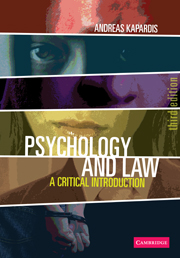Book contents
- Frontmatter
- Contents
- List of case studies
- Acknowledgements
- Foreword
- 1 Psycholegal Research: An Introduction
- 2 Eyewitnesses: Key Issues and Event Characteristics
- 3 Eyewitnesses: The Perpetrator and Interviewing
- 4 Children as Witnesses
- 5 The Jury
- 6 Sentencing as a Human Process, Victims, and Restorative Justice
- 7 The Psychologists as Expert Witnesses
- 8 Detecting Deception
- 9 Witness Recognition Procedures
- 10 Psychology and the Police
- 11 Conclusions
- Notes
- References
- Index
4 - Children as Witnesses
- Frontmatter
- Contents
- List of case studies
- Acknowledgements
- Foreword
- 1 Psycholegal Research: An Introduction
- 2 Eyewitnesses: Key Issues and Event Characteristics
- 3 Eyewitnesses: The Perpetrator and Interviewing
- 4 Children as Witnesses
- 5 The Jury
- 6 Sentencing as a Human Process, Victims, and Restorative Justice
- 7 The Psychologists as Expert Witnesses
- 8 Detecting Deception
- 9 Witness Recognition Procedures
- 10 Psychology and the Police
- 11 Conclusions
- Notes
- References
- Index
Summary
Beginning in the 1980s, a number of legal and sociopolitical movements thrust children onto the center stage of the legal arena, fostering unprecedented interest in their ability to recall autobiographical events.
(Dickinson, Poole and Laimon, 2005:151).Child victim witnesses, when being cross-examined in adult criminal court, are subjected to a range of punitive linguistic strategies. The meaning and essence of their own experiences are systematically denied. Credibility is reduced and all problems are made, as in soap operas, personal rather than systemic or social.
(Brennan, 1995:71)Children have a right to justice and their evidence is essential if society is to protect their interests and deal effectively with those who would harm them.
(Jack and Yeo, 1992)The demonstrable fact that investigative interviews with young children can be rendered worthless by inept practice should not blind us to the substantial literature demonstrating that reliable information can be elicited from young children who are competently interviewed, however.
(Lamb et al., 1995:446)INTRODUCTION
Since the early 1980s increasingly more children testify in court in criminal and civil cases as victims and witnesses and a number of widely-publicised cases of alleged child abuse in the UK (for example, Cleveland, Broxsowe in Nottingham) and in the US (for example, Kelly Michaels and the McMartin cases) where the investigation miscarried, have highlighted limitations of a variety of professionals tasked with interviewing child witnesses and the agencies involved in investigating, prosecuting such cases and responding to child witnesses' needs.
- Type
- Chapter
- Information
- Psychology and LawA Critical Introduction, pp. 112 - 147Publisher: Cambridge University PressPrint publication year: 2009

